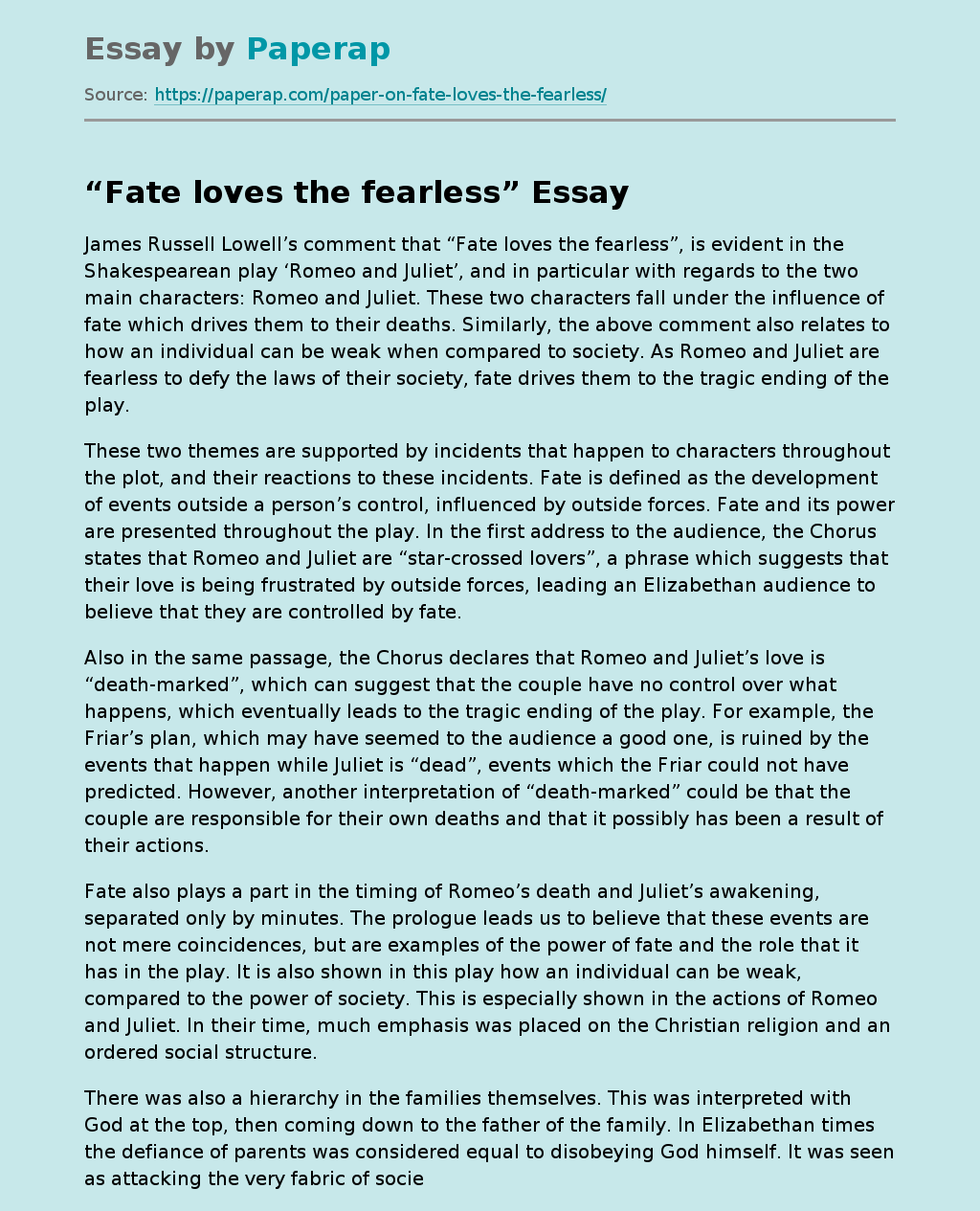“Fate loves the fearless”
James Russell Lowell’s comment that “Fate loves the fearless”, is evident in the Shakespearean play ‘Romeo and Juliet’, and in particular with regards to the two main characters: Romeo and Juliet. These two characters fall under the influence of fate which drives them to their deaths. Similarly, the above comment also relates to how an individual can be weak when compared to society. As Romeo and Juliet are fearless to defy the laws of their society, fate drives them to the tragic ending of the play.
These two themes are supported by incidents that happen to characters throughout the plot, and their reactions to these incidents. Fate is defined as the development of events outside a person’s control, influenced by outside forces. Fate and its power are presented throughout the play. In the first address to the audience, the Chorus states that Romeo and Juliet are “star-crossed lovers”, a phrase which suggests that their love is being frustrated by outside forces, leading an Elizabethan audience to believe that they are controlled by fate.
Also in the same passage, the Chorus declares that Romeo and Juliet’s love is “death-marked”, which can suggest that the couple have no control over what happens, which eventually leads to the tragic ending of the play. For example, the Friar’s plan, which may have seemed to the audience a good one, is ruined by the events that happen while Juliet is “dead”, events which the Friar could not have predicted. However, another interpretation of “death-marked” could be that the couple are responsible for their own deaths and that it possibly has been a result of their actions.
Fate also plays a part in the timing of Romeo’s death and Juliet’s awakening, separated only by minutes. The prologue leads us to believe that these events are not mere coincidences, but are examples of the power of fate and the role that it has in the play. It is also shown in this play how an individual can be weak, compared to the power of society. This is especially shown in the actions of Romeo and Juliet. In their time, much emphasis was placed on the Christian religion and an ordered social structure.
There was also a hierarchy in the families themselves. This was interpreted with God at the top, then coming down to the father of the family. In Elizabethan times the defiance of parents was considered equal to disobeying God himself. It was seen as attacking the very fabric of society. Both Romeo and Juliet defy their parents when they fall in love for each other, especially because they are of opposing families. As the head of the family, the father has power over all members of the family, especially females.
Therefore, the defiance of her parents is extremely dangerous for Juliet. For example, she is particularly vulnerable when refusing to marry Paris, causing the anger and rage of her father. The intensity of Romeo and Juliet’s love leads them to act in an un-Christian manner, as they start to think of each other in blasphemous terms. For example, Juliet calls Romeo “the god of my idolatry,” elevating Romeo to the level of God. It also leads them to break the laws of society, using darkness to cover their actions from other people.
As a result of these breaches, it is shown how the individual can be weak when compared to society. As explained above, Romeo and Juliet are seen to fall under the power of fate, which leads them to the disastrous ending of the play. Being both young and fearless, they breach the rules of society. The consequences of this show how vulnerable they can be when singled out as individuals. These two themes are revealed by incidents in the play and the characters’ reactions to them.
“Fate loves the fearless”. (2017, Oct 23). Retrieved from https://paperap.com/paper-on-fate-loves-the-fearless/

